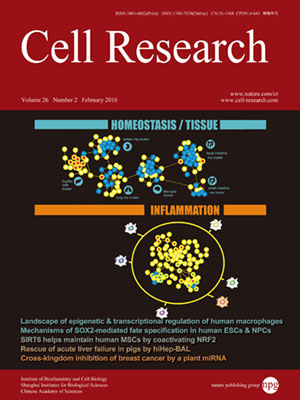
Volume 26, No 2, Feb 2016
ISSN: 1001-0602
EISSN: 1748-7838 2018
impact factor 17.848*
(Clarivate Analytics, 2019)
Volume 26 Issue 2, February 2016: 217-228
ORIGINAL ARTICLES
Cross-kingdom inhibition of breast cancer growth by plant miR159
Andrew R Chin1,6, Miranda Y Fong1, George Somlo2, Jun Wu3, Piotr Swiderski4, Xiwei Wu5 and Shizhen Emily Wang1
1Department of Cancer Biology, Duarte, CA 91010, USA
2Department of Medical Oncology, Duarte, CA 91010, USA
3Department of Molecular Medicine, Duarte, CA 91010, USA
4Cores of Synthetic and Biopolymer Chemistry, Duarte, CA 91010, USA
5Cores of Integrative Genomics, City of Hope Beckman Research Institute and Medical Center, Duarte, CA 91010, USA
6City of Hope Irell & Manella Graduate School of Biological Sciences, Duarte, CA 91010, USA
Correspondence: Shizhen Emily Wang,(ewang@coh.org)
MicroRNAs (miRNAs) are critical regulators of gene expression, and exert extensive impacts on development, physiology, and disease of eukaryotes. A high degree of parallelism is found in the molecular basis of miRNA biogenesis and action in plants and animals. Recent studies interestingly suggest a potential cross-kingdom action of plant-derived miRNAs, through dietary intake, in regulating mammalian gene expression. Although the source and scope of plant miRNAs detected in mammalian specimens remain controversial, these initial studies inspired us to determine whether plant miRNAs can be detected in Western human sera and whether these plant miRNAs are able to influence gene expression and cellular processes related to human diseases such as cancer. Here we found that Western donor sera contained the plant miRNA miR159, whose abundance in the serum was inversely correlated with breast cancer incidence and progression in patients. In human sera, miR159 was predominantly detected in the extracellular vesicles, and was resistant to sodium periodate oxidation suggesting the plant-originated 2'-O-methylation on the 3′ terminal ribose. In breast cancer cells but not non-cancerous mammary epithelial cells, a synthetic mimic of miR159 was capable of inhibiting proliferation by targeting TCF7 that encodes a Wnt signaling transcription factor, leading to a decrease in MYC protein levels. Oral administration of miR159 mimic significantly suppressed the growth of xenograft breast tumors in mice. These results demonstrate for the first time that a plant miRNA can inhibit cancer growth in mammals.
10.1038/cr.2016.13
FULL TEXT | PDF
Browse 2028


